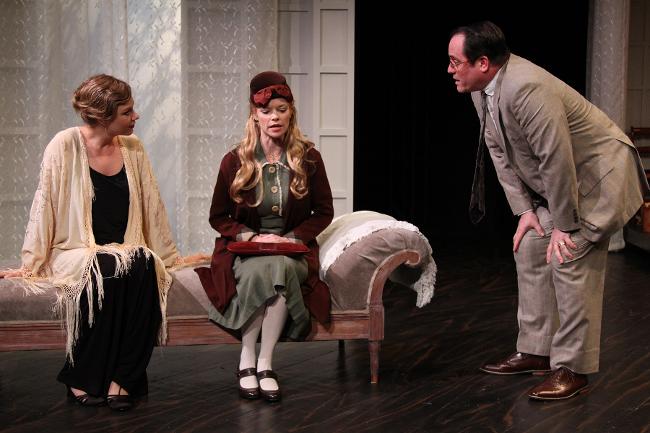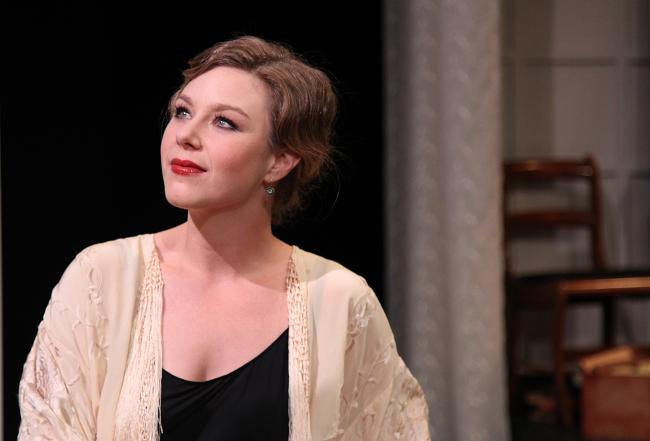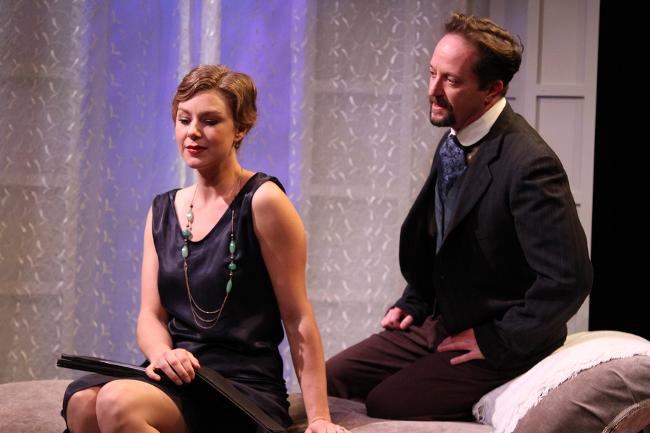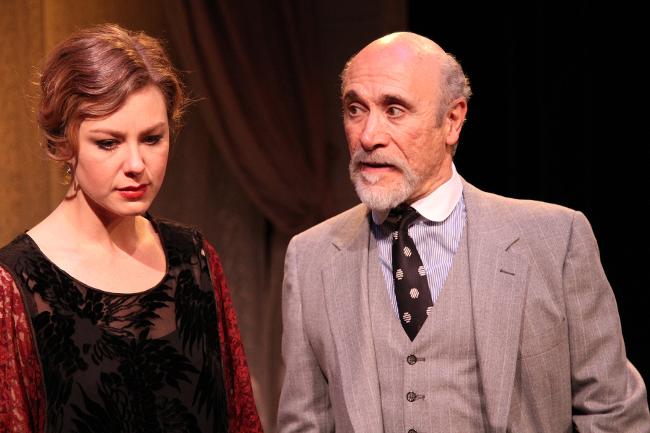6-19-16
Ibsen Down the Line: Hedda Gabler at the Antaeus
By Diane Sippl

Jaimi Paige as Hedda Gabler, Ann Noble as Thea Elvsted, and Adrian LaTourelle as Jørgen Tesman
What is life? a fighting
In heart and brain with Trolls.
Poetry? That means writing
Doomsday-accounts of our soul.
— Henrik Ibsen
As you can tell, I’m not blaming “Victorian mores” for either Hedda’s or anybody else’s behavior in the play. I don’t think the problems dramatized in Hedda Gabler derive only from the conventions of a particular era, and in any case the social reforms Ibsen may have been seeking were far from accomplished even a century after the play’s premiere in the late 19th century. To emphasize this, I shifted the period of this production some 30 years forward… to the early 1920s — not a time frame most people would immediately associate with restrictive or limited behavior. And that’s just my point. What keeps a person from being able to shape or control his or her life? A good question — and the reason why I wanted to direct this play.
— Steven Robman, Director
The Antaeus Theatre Company, arguably the most accomplished and under-appreciated repertory establishment in Los Angeles (moving this fall to an expanded, more upscale venue in Glendale), has once again mounted a classic for our times in Steven Robman's stimulating production of Hedda Gabler. The policy of double-casting, in effect since the company was launched in 1991, clearly enriches the interpretive possibilities in the acting, as is expected of any ensemble-in-residence, few as there are these days. I saw the Generals (as opposed to the Pistols) and will credit the individuals as this article progresses. But first a digression, hopefully appropriate.
Hedda in the 1920s
When Eva Le Gallienne, Director of the Civic Repertory Theatre in New York City, prepared to play Hedda Gabler in 1927, she found the play so modern that it “should be dressed in modern clothes,” but then, having studied the role, found herself mistaken. Never mind the throngs of “New Women” in the city, wage earners and careerists alike, Hedda was cut of her own cloth, a “great lady,” observed one Grande Dame of another. One problem with moving the play to the 1920s is that post-suffrage, in the post-corset-and-bustle era, with raised hems and bobbed hair, the female characters all too easily suggest their “freedom,” far beyond Hedda’s.
Take, for example, Philip Barry’s materialistic newlywed Julia Seton in Holiday, a 1928 version of the high-style “good life” Mrs. Tesman, Ibsen’s new bride, just home from a whirlwind honeymoon (or was it an academic sojourn?), is seeking. Barry’s play may have been a light comedy of manners and Ibsen’s a dark domestic drama, but the nearly four-decade gap shows a landslide of new assumptions that could be claimed by women. In the Lost Generation of the ‘20s, women were finding they wings, so much so that by 1925, Craig’s Wife revealed what a scandal it was for a woman to be obsessed with her own well-to-do home. It might already have looked like a cultural backlash when George Kelly gave us the proud and domineering Harriet Craig who essentially bulldozed husband, family, and friends out of her way to erect a glistening palace habitable by none but her. Considered one of the best plays of the decade, it showed what could come of the empowerment of the “gentle sex” — or of a society that shoehorned females into domestic roles.
Already by 1913 Susan Glaspell and George Cram Cook had tested the waters of Freud’s new fascination with women by writing and performing their first play, the two-scene Suppressed Desires, a satire of dream theory and psychoanalysis, in a Provincetown fish shanty, eventually bringing it to New York’s “matinee crowd.” Freud was buzzing on the lips of the intelligentsia and needed scrutinizing. And by 1916 at the same Wharf Theatre, Susan Glaspell had written and performed her one-act Trifles, in which Minnie Wright (off-stage) has murdered her husband on their Iowa homestead, leaving her female neighbors to digest the full depth of women’s confinement. Audiences would have to wait until 1930 for Glaspell’s Alison’s House, with its past action closer to Hedda’s time, to dwell upon the punitive effects of the male order, institutionalized religion, and social propriety on a brilliant mind — that of Emily Dickinson — as she internalized, processed, re-imagined in her own words, and then tied into bundles for her dresser drawer all that Ibsen had begun to unleash in her own day.

Jaimi Paige as Hedda Gabler
Hedda in Her Time
In an Afterword to Hedda Gabler published ten years ago, Joan Templeton wrote,
To argue that Hedda is a defective or neurotic woman because she rejects Tesman, the boring, pedantic boy-man she married because no one else asked, and Løveborg, the brilliant, alcoholic frequenter of brothels she prefers, is to assume that simply because they are there, she ought to love one of them. But the marriageable man is sexless, the sexual man unmarriageable.
In 1886 when Freud set up his clinic in Vienna to study nervous disorders, Ibsen was still living in exile, in Munich by then, and certainly knew of the budding psychoanalyst, already substantially published. Was Hedda a case of repressed hysterics? Henry James caught the right perspective: “That Mrs. Tesman is a perfectly ill-regulated person is a matter of course… (what interests Ibsen) is precisely a wicked, diseased, disagreeable woman.” And when one experienced her drama, James continued, one wasn’t “so sure” that she was wicked and “by no means sure” that she was disagreeable. Deviously scheming, brutally manipulative, Hedda, not unlike her offspring Minnie Wright and Harriet Craig, is boxed in and boxing her way out — but that’s just it: she is their progenitor.
To be fair, we can compare the play to Mrs. Warren’s Profession (written in 1893, first performed in 1902) by one of the Norwegian’s great champions, George Bernard Shaw, who made him famous through The Quintessence of Ibsenism by calling him a true pioneer. Of the character in question, Shaw wrote:
Hedda Gabler has no ethical ideals at all, only romantic ones. She is a typical nineteenth-century figure falling into the abyss between the ideals which do not impose on her and the realities she has not yet discovered. The result is that though she has imagination, and an intense appetite for beauty, she has no conscience, no conviction: with plenty of cleverness, energy, and personal fascination, she remains mean, envious, insolent, cruel in protest against others’ happiness, fiendish in her dislike of inartistic people and things, a bully in reaction from her own cowardice.
Then again, as Rolfe Fjelde, an Ibsen translator, has pointed out, “Shaw, in his plays, is interested in human beings insofar as they express ideas, whereas Ibsen is interested in ideas insofar as they are expressions of human beings.”

Jaimi Paige as Hedda Gabler, Daniel Blinkoff as Ejlert Løvborg
Hedda’s “Sisters” on the Screen
We need only peek at the novel and the cinema to see historical precedents for Hedda as a person all the while she is a product of her social position, her choices, and the turn of events. In Love and Friendship, Whit Stillman shows how cagey, cold-hearted, manipulative, utterly charming, and compellingly attractive a practical Georgian lady could be when her (Jane Austen’s) society made it “uncomfortable” for her to live outside of marriage. With equal wit, Ralph Fiennes only a year ago revealed how Charles Dickens himself, between wife and mistress alike, joined the ranks of the patriarchal English society of the Victorian era by creating an “Invisible Woman” in an actress-cum-theatre director, no less, that his mistress was, but also in his wife, the mother of the numerous children he fathered.
Going back to the era to which the Antaeus production takes us, in the 1929 of the film Genius (out now), Nicole Kidman plays Aline Bernstein, a leisure-class wife and mother, only to toss it off and fall for the young, yet unknown writer Thomas Wolfe and support him with earnings from her job as a set designer for New York’s prestigious Theatre Guild, her love, and her sex — all to her dismay. The obsessive-compulsive writer in her mate prefers his work. She is theatrical, to say the least — a proud, possessive, scene-stealing shrew, as they come, and one bearing pistols, no less. But she comes thirty years down the line from Hedda.
Ibsen
“Peer, you’re lying,” was the first line of Ibsen’s most poetic play. That one utterance would sum up all the soul-searching of his subsequent works. In Peer Gynt (1867) Ibsen posed the problem of the distance between hollow pride and effective authenticity. Attractive but unprincipled characters who preferred to evade and compromise rather than to see themselves as they really were would populate the pages he wrote over the next three decades. Always with an eye for both the heroism and the inhumanity of blind idealism, Ibsen turned from acute social tensions such as those in A Doll’s House (1879) to complex character relationships as in Ghosts (1881) to the contradictions and fissures of the inner psyche. If The Wild Duck (1884) justified illusion as a survival mechanism and Rosmersholm (1886) shored up the consequences of using another human being, then all of these themes — in sum, the self-deception of an empty life — brewed and festered in Hedda Gabler (1889), not that they weren’t present throughout the entire twelve-play succession of Ibsen’s masterpieces written between 1877 and 1899.
Given the painter he was at an early age and the photographer he later joked he’d become when his plays were rejected, Ibsen allowed his poet’s imagination to become bound up with a symbolic use of the physical elements of his play. And given that he considered the poet to be a seer — at once a critic and a prophet — however universal his themes became, they became so through their particularities. Hedda Gabler is not a drama of growth and development, certainly not of its protagonist. It is an enveloping portrait of Hedda, in all her rhetorical refinement. She is the product of her social class, the daughter of a General and the aristocracy, who has succumbed to marrying the son of two aunts in the petty bourgeoisie. This conflict plays out both in the background and the foreground, where it really matters that the material manifestations of Ibsen’s ideas take their assigned places.

Jaimi Paige as Hedda Gabler, Tony Amendola as Judge Brack
Hedda Gabler
Miss Tesman’s hat, a tawdry country bonnet as Hedda sees it, annoys Hedda; it's an eye sore tossed haphazardly on the fine furniture. And those furnishings include a piano, befitting a high-society lady; Hedda is meant to play it, frantically, in her grand finale. A portrait of her father in uniform needs to adorn the walls just as the heirloom of his pistols casts a pall over the room; the black porcelain stove, detached and utilitarian rather than hearth-like and integral to the home, needs to be visible downstage, as much for warmth as for devastation. The same slippers that bring Tesman cozy comfort need to give rise to Hedda’s contempt for his middle-class contentment and sentimentality.
The language carries the decorum of the atmosphere, beginning with Hedda herself, her very name pronouncing the idea that she is her father’s daughter, not her husband’s wife. Tesman’s bragging patter, ingratiating enough but relentless, is a counterpoint to Hedda’s insistence on the appropriate way of addressing her: Thea is too formal, Løveborg too intimate. Yet there is a strange ambivalence here, because each tone is the opposite of how Hedda’s heart would have it.
The playwright parallels this irony of language in the actions he lays out for his characters. For all the confidence and certitude — often passing as grace — of her demeanor, Hedda is afraid to fend for herself, so she lives vicariously through others, not passively, as some kind of meddler, but as a creator and manager of destiny. This manipulation, particularly of Løveborg, who used to admire her, both gratifies her ego and releases her rage at what she deems a dismal failure. Then when Judge Brack is the one person she cannot manage, and she sees that her fate and reputation are for him manage, she makes a choice, the only kind she knows how to make.
Judge Brack is often quoted for his final line in the play, “Good God! — people don’t do such things.” As he told Hedda a moment before that, “People say such things — but they don’t do them.” Yet if once she was inspired and longed for life, Hedda is unable to pursue it, so her force, mighty enough, ultimately becomes centrifugal. The Judge is the clearest manifestation of reputation in the play, and he is the most two-faced of all, in ethics, behavior, and social posturing. Løveborg astonishingly sobers up and produces not only his first book, his labor of love, but also his second, perhaps the book of the century, apparently nourished by the attention and kindness of Mrs. Elvsted, who in fact does have the courage to leave a loveless marriage. And both she and Tesman, in humble devotion, are actually willing to “resurrect” Løveborg’s “dead” manuscript, the second “child” Hedda would destroy.
Staging the Play
Jaimi Paige plays Hedda as coy and seductive, not a cougar in a cage but a designing woman who need only lay down the path for the cards to fall. Then only two actions are incumbent upon her, the one tragically leading to the other. Until the end Ms. Paige endows Hedda with the opacity her enigmatic character requires. Ann Noble plays Thea Elvsted as the New Woman of action that she is, ineloquent and nearly stuttering beside Hedda yet beautiful in her modest sincerity and therefore unconsciously attractive to Tesman, her new workmate. Adrian LaTourelle is becoming as Hedda’s scholar husband, paradoxically small-minded, especially in comparison with Løveborg’s flair and Judge Brack’s clout. The former a dreamer and the latter a killer of dreams, they are quite a pair, Daniel Blinkoff essentially smoldering as the ashes of Hedda’s fire and Tony Amendola as the sexual blackmailer who can put out Hedda’s flame.
Hedda Gabler
Cast: The Generals — Amelia White, Elizabeth Denny, Adrian LaTourelle, Jaimi Paige, Ann Noble, Tony Amendola, Daniel Blinkoff.
Original Play: Henrik Ibsen; Adaptation: Andrew Upton; Director: Steven Robman; Scenic Designer: Se Hyun Oh; Costume Designer: Leah Piehl; Lighting: Leigh Allen; Sound Designer: Cricket Myers; Props Designer: Erin Walley.
Photos by Karianne Flaathen
Runs May 26-July 17, 2016
The Antaeus Theatre Company
5112 Lankershim Blvd., North Hollywood, CA 91601 Tel. 818-506-1983 www.Antaeus.org